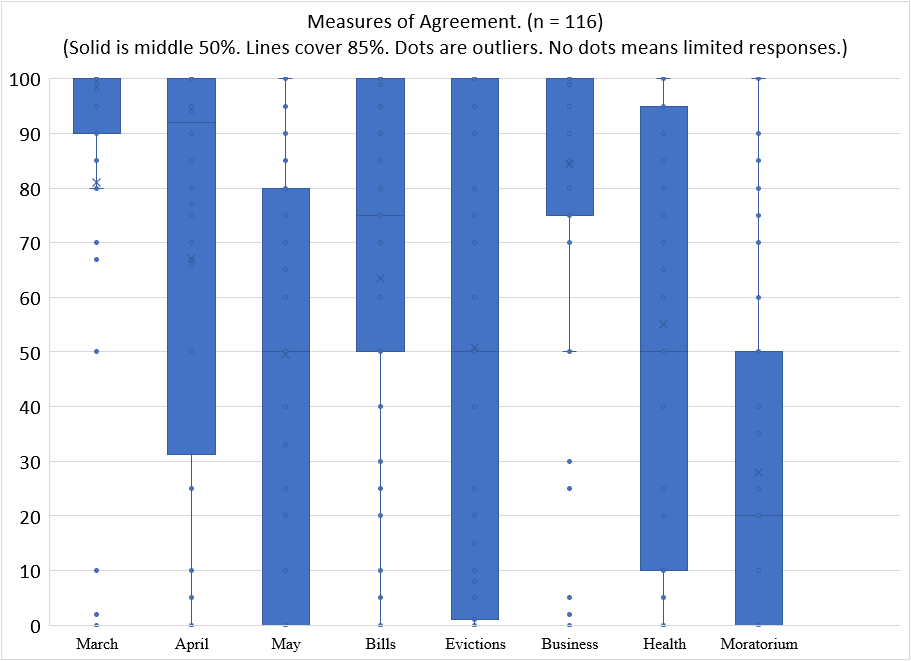Eviction Moratorium Survey Results: 22% of Providers Unable to Pay for Housing
| . Posted in News, policy - 5 Comments
On Thursday, April 16, 2020, MassLandlords launched a survey of members about the eviction moratorium then expected to pass into law (191-H4647). Over the following 24 hours, 116 of our 1,800 members participated. The survey shows decreasing confidence in rent collection, uneven impact of the moratorium, and housing providers being unable to maintain housing and/or exiting the business.
Survey Methodology
The survey asked members to indicate agreement or disagreement with a set of statements. The survey used a score voting mechanism, which was already familiar to members and the fastest available tool to get input. A score of “0” indicated “disagreement with all my heart”, a score of “100” indicated “agreement with all my heart,” and a score of “50” was a point of indifference. Future surveys might assign discrete categories of agreement such as “strongly agree”, but for the purpose of this analysis, the following terms correspond to the following scores:
- “undecided”: a score of exactly 50
- “agreed”: a score greater than 50 but less than 75
- “strongly agreed” a score greater than or equal to 75
- “disagreed” a score less than 50 but greater than 25
- “strongly disagreed” a score less than or equal to 25.
As the survey will be used for allocation of MassLandlords resources, the survey was open to members only.

- March: My March rents were fully paid.
- April: My April rents are fully paid.
- May: My May rents will be fully paid.
- Bills: I will be able to pay all of my bills this year.
- Evictions: I will have to file one or more evictions as soon as the moratorium ends.
- Business: I will still be in the business of providing housing at the end of this year.
- Health: Stopping evictions and foreclosures makes sense from a public health point of view.
- Moratorium: I support the eviction and foreclosure moratorium as written.
Decreasing Confidence in Ability to Provide Housing
The difference between March and May in terms of rent collection is the most significant result, with 80% of members agreeing or strongly agreeing with the statement “My March rents were fully paid” and only 46% agreeing or strongly agreeing that “My May rents will be fully paid.”
When asked “I will be able to pay all of my bills this year,” 22% of members disagreed or strongly disagreed. (Landlords do not qualify for unemployment, SBA paycheck protection loans, and other relief measures including, with some exceptions, the mortgage forbearance in the moratorium bill itself.)
Sample of open-ended comments reproduced verbatim:
- “I am a nurse that owns a 2 family house. If my tenant is unable to pay their rent, I would have to work 6 shifts every week. That would be a hardship during this Covid-19 Pandemic.”
- “Answering for my 83 year old parents who can’t do technology well. They have 13 units that are their income and have worked 40+ years to own them. I don’t think they’ll be able to pay their bills this year from rental income without going into savings.”
- “Real estate taxes and possibly insurance needs the same breaks to match the in adequate rents or eviction delay.”
Many Evictions are Inevitable
When asked, “I will have to file one or more evictions as soon as the moratorium ends,” 42% of members agreed or strongly agreed, and another 16% were undecided. Some entered the pandemic with rent already owing, others pointed out the rent strike.
Sample of open-ended comments (anonymized but otherwise verbatim):
- “We had an eviction hearing for non payment pending in [Western MA] with a court date of 3-18-20 when the city closed down. We were already in dire straits before the covid shutdown. The courts need to reopen with appropriate social distancing just like stores and other public places are doing now.”
- “I don’t know what to do because [my tenant] has not paid her Feb. 2020 rent and March 2020 rent.”
- “2 tenants are just not paying even though they didn’t have any change in income. Why pay if gvt. says OK not to pay.”
Decreasing Interest in Providing Housing
When asked, “I will still be in the business of providing housing at the end of this year,” 71% of members agreed or strongly agreed, but 5% of members disagreed or strongly disagreed.
Sample of open-ended comments reproduced verbatim:
- “no rents,i,m out of business”
- “With laws like this I want out to get of this business”
- “Although i plan on keeping my exisiting properties, i will not invest money into this state in the future. I’ll be moving my investments to the south.”
- “What I personally am doing is refusing to rent my properties as they become vacant until this regulatory uncertainty is removed”
Mixed Support
When asked, “Stopping evictions and foreclosures makes sense from a public health point of view.”, 36% disagreed or strongly disagreed, and 49% agreed or strongly agreed. In the context of score voting as applied to elections and issues, this result indicates lack of consensus.
When asked, “I support the eviction and foreclosure moratorium as written,” 65% disagreed or strongly disagreed, 20% agreed or strongly agreed.
Sample of open-ended comments reproduced verbatim:
- “I support the moratorium, but assuming that the state of emergency will be lifted fairly soon.”
- “The hardship of this pandemic cannot be shifted entirely to those who provide housing. It is an innapropriate response.”
- “We are lucky most tenants have income so far”
MassLandlords has advocated for a rental housing guarantee instead or in addition to an eviction moratorium.
A rental housing guarantee might ensure that housing providers continue operating even without rent.




